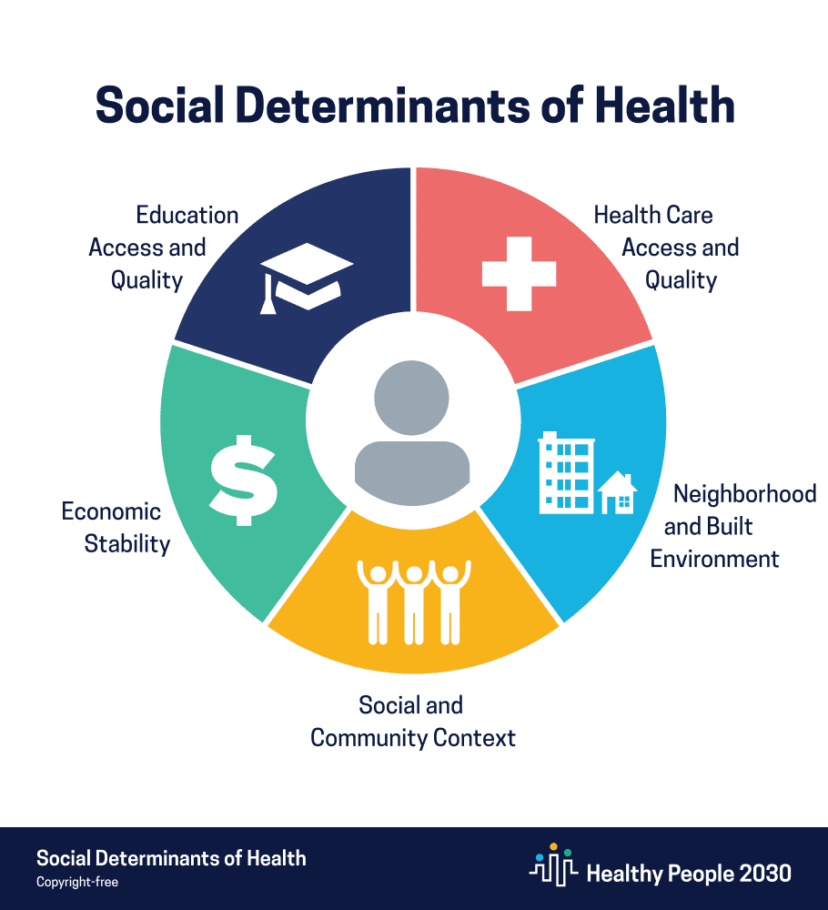
Understanding Mental Health and Social Determinants of Health (SDOH)
Mental health is a fundamental aspect of overall well-being, influencing how we think, feel, and act in our daily lives. However, the state of our mental health is not solely determined by our individual experiences or biology. Rather, it is intricately linked to various social, economic, and environmental factors known as Social Determinants of Health (SDOH). In this blog post, we will explore the importance of understanding the relationship between mental health and SDOH and how addressing these determinants is crucial for promoting mental well-being on a broader scale.
What are Social Determinants of Health (SDOH)?

Social Determinants of Health (SDOH) are the conditions in which people are born, grow, live, work, and age that shape their health outcomes. These determinants encompass a wide range of factors, including socioeconomic status, education, employment, access to healthcare, social support networks, and the physical environment. While individual behaviors and genetics play a role in health outcomes, research suggests that SDOH have a far greater impact on overall health and well-being.
The Impact of SDOH on Mental Health
The influence of SDOH on mental health cannot be overstated. Individuals who experience socioeconomic disadvantage, discrimination, housing instability, food insecurity, or lack of access to quality education and healthcare are at a higher risk of developing mental health disorders. Moreover, these same factors can exacerbate existing mental health conditions, leading to poorer treatment outcomes and higher rates of relapse.
For example, someone living in a low-income neighborhood with limited access to mental health services may struggle to receive timely and appropriate care for conditions such as depression or anxiety. Similarly, individuals facing systemic discrimination or social isolation may experience chronic stress, contributing to the development of mood disorders or substance abuse problems.
Addressing Mental Health Disparities through SDOH Interventions
Recognizing the impact of SDOH on mental health is the first step towards implementing effective interventions that promote equity and well-being for all. By addressing the root causes of mental health disparities, such as poverty, inequality, and lack of access to resources, we can create environments that support positive mental health outcomes for individuals and communities.
Some key strategies for addressing mental health disparities through SDOH interventions include:
1. Economic Empowerment: Implementing policies that reduce income inequality, increase access to stable employment, and provide financial assistance to low-income individuals and families can improve mental health outcomes by alleviating financial stressors and promoting economic security.
2. Access to Healthcare: Expanding access to affordable and culturally competent mental health services, including therapy, counseling, and psychiatric care, can help reduce barriers to treatment and ensure that all individuals receive the care they need to thrive.
3. Education and Awareness: Promoting mental health literacy and destigmatizing mental illness through education and awareness campaigns can encourage help-seeking behavior and foster supportive communities that prioritize mental well-being.
4. Social Support Networks: Strengthening social support networks and community resources, such as peer support groups, crisis hotlines, and community centers, can provide vital emotional and practical support to individuals experiencing mental health challenges.
UPOH’s Approach to Addressing SDOH

United Providers of Health (UPOH) is committed to addressing the complex interplay between mental health and Social Determinants of Health (SDOH). Recognizing the unique challenges faced by rural residents, UPOH adopts a holistic approach to promote mental well-being and improve health outcomes.
Through collaborative efforts with local organizations, community leaders, and government agencies, UPOH works to identify and address the root causes of health disparities in areas of need. By leveraging existing resources and expertise within the community, UPOH aims to create sustainable solutions that address socioeconomic, environmental, and systemic factors contributing to poor health outcomes.
Conclusion
Understanding the interplay between mental health and Social Determinants of Health (SDOH) is essential for addressing mental health disparities and promoting well-being for all individuals. By recognizing the impact of socioeconomic, environmental, and systemic factors on mental health outcomes, we can develop holistic interventions that address the root causes of mental health disparities and create communities that support positive mental health for everyone. By prioritizing equity, access, and social justice, we can build a future where mental health is recognized as a fundamental human right, and all individuals have the opportunity to thrive.
Sources:
Alegría M, NeMoyer A, Falgàs Bagué I, Wang Y, Alvarez K. Social Determinants of Mental Health: Where We Are and Where We Need to Go. Curr Psychiatry Rep. 2018 Sep 17;20(11):95. doi: 10.1007/s11920-018-0969-9. PMID: 30221308; PMCID: PMC6181118.
Centers for Disease Control and Prevention. (2022, December 8). Social Determinants of Health at CDC. Centers for Disease Control and Prevention. https://www.cdc.gov/about/sdoh/index.html#:~:text=Social%20determinants%20of%20health%20(SDOH,the%20conditions%20of%20daily%20life.
Pinals, D. A., Fuller, D. A., & Pinals, M. J. (2021, December). Social Determinants of Health and Mental Health. Retrieved March 1, 2024,.
